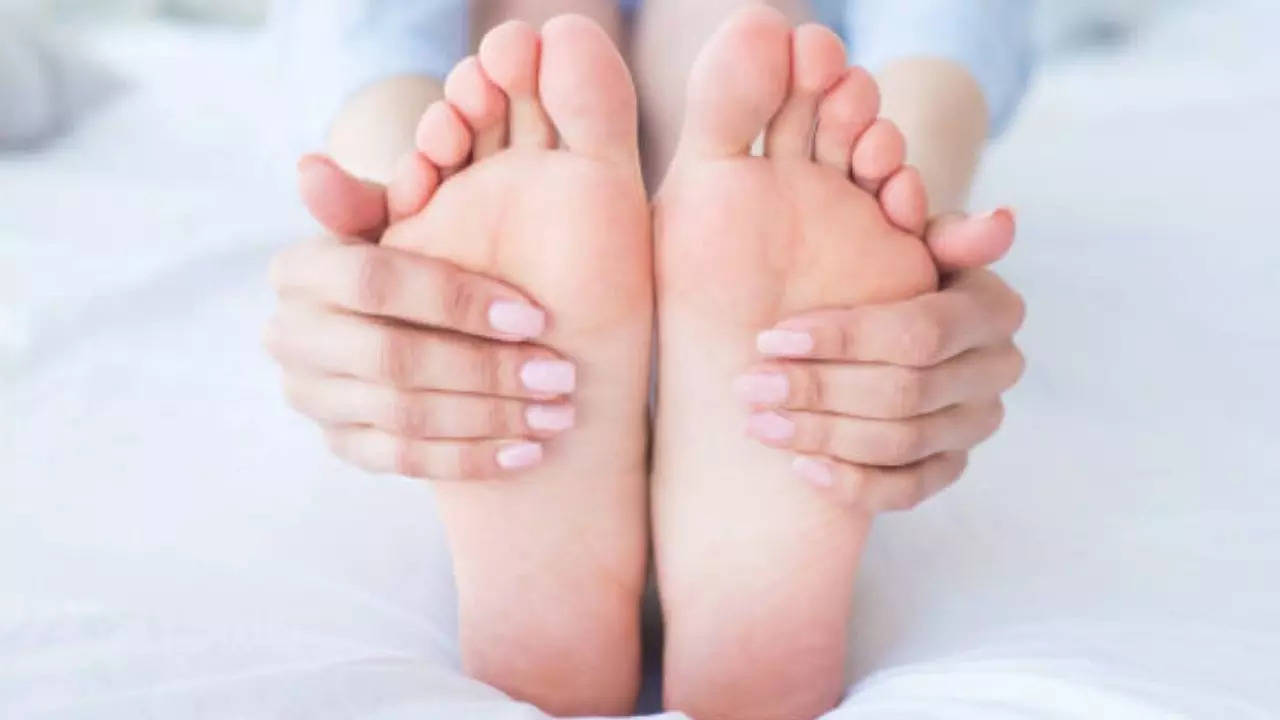Table of Contents

Our overall health is reflected in our feet, which frequently serve as early warning signs of underlying issues that may require medical attention. Changes in the foot can indicate a variety of health problems, from pain and irregular nail growth to differences in skin colour. By paying attention to the health of your feet, you can catch potential medical issues early and take appropriate steps for diagnosis and treatment. But how to know which sign is a symptom of a disease? We got in touch with Dr Akhilesh Yadav, Associate Director- Orthopaedics and Joint Replacement, Max Hospital Vaishali who explains the signs and symptoms.
1. Cold Feet: Issues With Circulation
Even in warm conditions, if your feet feel cold all the time, it could be an indication of impaired circulation. This may be a sign of more serious heart disorders or peripheral artery disease (PAD). Plaque accumulation causes arteries to constrict in PAD, limiting blood flow to the extremities. If this is accompanied by discomfort, cramping, or numbness, it’s crucial to visit a doctor since it could lead to significant problems if left untreated.
2. Foot Pain: Gout Or Arthritis
Prolonged foot pain, especially in the joints, may indicate gout or arthritis. Gout, which is brought on by elevated blood uric acid levels, produces abrupt, excruciating pain that frequently begins in the big toe. Arthritis, on the other hand, can cause stiffness, swelling, and discomfort in the foot joints. Early treatment of diseases like gout and arthritis can reduce symptoms and enhance quality of life.
3. Swollen Feet: Retention Of Fluid
Foot oedema is frequent during pregnancy, during extended flights, and after extended periods of standing. On the other hand, chronic edema, or swelling, may indicate more significant health issues such as liver, renal, or heart failure. If swelling is accompanied by exhaustion or dyspnea, prompt medical intervention may be necessary.
4. Diabetes-Related Numbness Or Tingling:
Diabetes, especially diabetic neuropathy, may be indicated by tingling or numbness in the feet. Prolonged elevated blood sugar levels can cause damage to the nerves in your limbs, which is why this syndrome arises. Infections, ulcers, or even amputation may result from it if left untreated. For diabetics to avoid complications, regular foot examinations and blood sugar management are crucial.
5. Gray Toes: Signs of Raynaud's DiseaseIn case your toes turn blue, white, or red in reaction to low temperatures or stress, it can be a sign of Raynaud's illness. This disease restricts blood flow by affecting the blood vessels in the extremities. Although lifestyle modifications can typically help control it, in more severe cases, medical attention may be necessary.
6. Dry, Damaged Heels: Thyroid Problems
Although cracked and severely dry heels can be an indication of hypothyroidism, a condition where the thyroid gland doesn’t generate enough hormones, dry skin on the foot is typical, especially in the winter. Hypothyroidism also leads to weight gain, tiredness, and cold sensitivity. It is worthwhile to speak with a doctor if you experience persistently dry skin in addition to other symptoms.
7. Non Healing Foot Sores: Diabetes or Insufficient Circulation
Unhealed lesions or sores on the feet may be a sign of vascular disorders or diabetes. Slow-healing sores are common in people with diabetes because of impaired blood flow and nerve damage. This is especially risky since neglected sores can develop infections and worsening consequences.
8. Arthritis Or Psoriasis – Pitted NailsYour toenails may have tiny pits or dents that are indicative of psoriasis, an inflammatory disease that affects the skin and nails. Psoriatic arthritis, a condition in which joints become inflamed and cause pain and stiffness, may also be linked to this. Psoriasis treatment can help control the disease and enhance nail health.
9. Lack Of Water Or Insufficient Nutrients: Foot Cramps
Foot cramps that come on suddenly and hurt could be a sign of dehydration or a shortage of vital minerals like calcium, magnesium, or potassium. A lack of these minerals can result in cramps because they are necessary for both muscle contraction and relaxation. Foot cramps can be avoided by eating a balanced diet and staying hydrated.
10. Toenail Changes: Fungus Or AnemiaA change in the thickness, colour, or form of your toenails might potentially reveal information about your health. Yellow, thick toenails may indicate a fungal infection that has to be treated. Conversely, brittle, white, or pale nails may indicate anaemia, a condition in which the body does not produce enough red blood cells to supply enough oxygen to the tissues.

